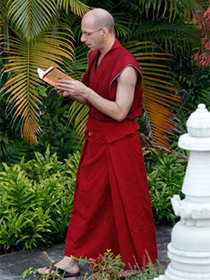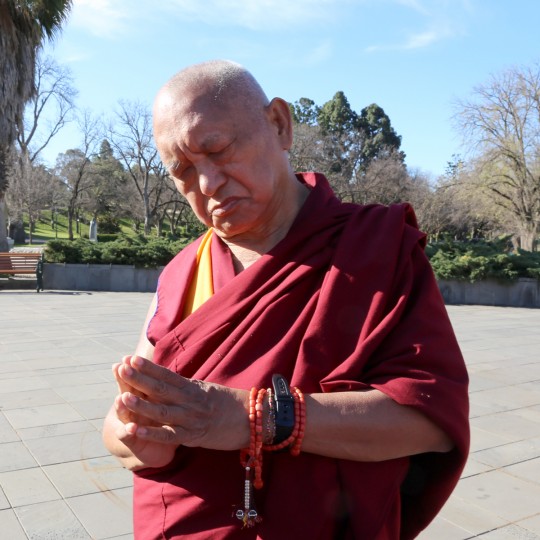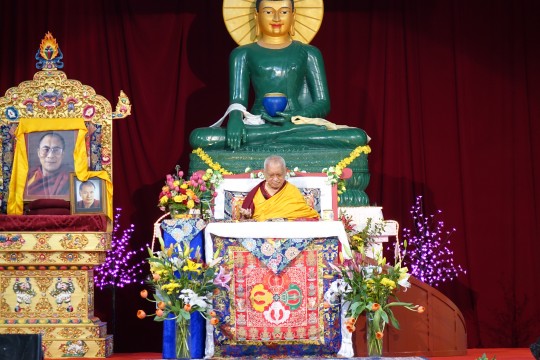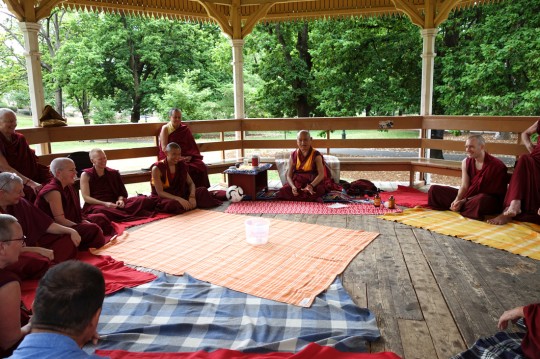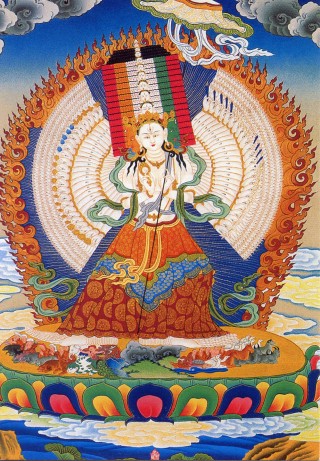- Home
- FPMT Homepage
Foundation for the Preservation of the Mahayana Tradition
The FPMT is an organization devoted to preserving and spreading Mahayana Buddhism worldwide by creating opportunities to listen, reflect, meditate, practice and actualize the unmistaken teachings of the Buddha and based on that experience spreading the Dharma to sentient beings. We provide integrated education through which people’s minds and hearts can be transformed into their highest potential for the benefit of others, inspired by an attitude of universal responsibility and service. We are committed to creating harmonious environments and helping all beings develop their full potential of infinite wisdom and compassion. Our organization is based on the Buddhist tradition of Lama Tsongkhapa of Tibet as taught to us by our founders Lama Thubten Yeshe and Lama Thubten Zopa Rinpoche.
- Willkommen
Die Stiftung zur Erhaltung der Mahayana Tradition (FPMT) ist eine Organisation, die sich weltweit für die Erhaltung und Verbreitung des Mahayana-Buddhismus einsetzt, indem sie Möglichkeiten schafft, den makellosen Lehren des Buddha zuzuhören, über sie zur reflektieren und zu meditieren und auf der Grundlage dieser Erfahrung das Dharma unter den Lebewesen zu verbreiten.
Wir bieten integrierte Schulungswege an, durch denen der Geist und das Herz der Menschen in ihr höchstes Potential verwandelt werden zum Wohl der anderen – inspiriert durch eine Haltung der universellen Verantwortung und dem Wunsch zu dienen. Wir haben uns verpflichtet, harmonische Umgebungen zu schaffen und allen Wesen zu helfen, ihr volles Potenzial unendlicher Weisheit und grenzenlosen Mitgefühls zu verwirklichen.
Unsere Organisation basiert auf der buddhistischen Tradition von Lama Tsongkhapa von Tibet, so wie sie uns von unseren Gründern Lama Thubten Yeshe und Lama Thubten Zopa Rinpoche gelehrt wird.
- Bienvenidos
La Fundación para la preservación de la tradición Mahayana (FPMT) es una organización que se dedica a preservar y difundir el budismo Mahayana en todo el mundo, creando oportunidades para escuchar, reflexionar, meditar, practicar y actualizar las enseñanzas inconfundibles de Buda y en base a esa experiencia difundir el Dharma a los seres.
Proporcionamos una educación integrada a través de la cual las mentes y los corazones de las personas se pueden transformar en su mayor potencial para el beneficio de los demás, inspirados por una actitud de responsabilidad y servicio universales. Estamos comprometidos a crear ambientes armoniosos y ayudar a todos los seres a desarrollar todo su potencial de infinita sabiduría y compasión.
Nuestra organización se basa en la tradición budista de Lama Tsongkhapa del Tíbet como nos lo enseñaron nuestros fundadores Lama Thubten Yeshe y Lama Zopa Rinpoche.
A continuación puede ver una lista de los centros y sus páginas web en su lengua preferida.
- Bienvenue
L’organisation de la FPMT a pour vocation la préservation et la diffusion du bouddhisme du mahayana dans le monde entier. Elle offre l’opportunité d’écouter, de réfléchir, de méditer, de pratiquer et de réaliser les enseignements excellents du Bouddha, pour ensuite transmettre le Dharma à tous les êtres. Nous proposons une formation intégrée grâce à laquelle le cœur et l’esprit de chacun peuvent accomplir leur potentiel le plus élevé pour le bien d’autrui, inspirés par le sens du service et une responsabilité universelle. Nous nous engageons à créer un environnement harmonieux et à aider tous les êtres à épanouir leur potentiel illimité de compassion et de sagesse. Notre organisation s’appuie sur la tradition guéloukpa de Lama Tsongkhapa du Tibet, telle qu’elle a été enseignée par nos fondateurs Lama Thoubtèn Yéshé et Lama Zopa Rinpoché.
Visitez le site de notre Editions Mahayana pour les traductions, conseils et nouvelles du Bureau international en français.
Voici une liste de centres et de leurs sites dans votre langue préférée
- Benvenuto
L’FPMT è un organizzazione il cui scopo è preservare e diffondere il Buddhismo Mahayana nel mondo, creando occasioni di ascolto, riflessione, meditazione e pratica dei perfetti insegnamenti del Buddha, al fine di attualizzare e diffondere il Dharma fra tutti gli esseri senzienti.
Offriamo un’educazione integrata, che può trasformare la mente e i cuori delle persone nel loro massimo potenziale, per il beneficio di tutti gli esseri, ispirati da un’attitudine di responsabilità universale e di servizio.
Il nostro obiettivo è quello di creare contesti armoniosi e aiutare tutti gli esseri a sviluppare in modo completo le proprie potenzialità di infinita saggezza e compassione.
La nostra organizzazione si basa sulla tradizione buddhista di Lama Tsongkhapa del Tibet, così come ci è stata insegnata dai nostri fondatori Lama Thubten Yeshe e Lama Zopa Rinpoche.
Di seguito potete trovare un elenco dei centri e dei loro siti nella lingua da voi prescelta.
- 欢迎 / 歡迎
简体中文
“护持大乘法脉基金会”( 英文简称:FPMT。全名:Foundation for the Preservation of the Mahayana Tradition) 是一个致力于护持和弘扬大乘佛法的国际佛教组织。我们提供听闻,思维,禅修,修行和实证佛陀无误教法的机会,以便让一切众生都能够享受佛法的指引和滋润。
我们全力创造和谐融洽的环境, 为人们提供解行并重的完整佛法教育,以便启发内在的环宇悲心及责任心,并开发内心所蕴藏的巨大潜能 — 无限的智慧与悲心 — 以便利益和服务一切有情。
FPMT的创办人是图腾耶喜喇嘛和喇嘛梭巴仁波切。我们所修习的是由两位上师所教导的,西藏喀巴大师的佛法传承。
繁體中文
護持大乘法脈基金會”( 英文簡稱:FPMT。全名:Found
ation for the Preservation of the Mahayana Tradition ) 是一個致力於護持和弘揚大乘佛法的國際佛教組織。我們提供聽聞, 思維,禪修,修行和實證佛陀無誤教法的機會,以便讓一切眾生都能 夠享受佛法的指引和滋潤。 我們全力創造和諧融洽的環境,
為人們提供解行並重的完整佛法教育,以便啟發內在的環宇悲心及責 任心,並開發內心所蘊藏的巨大潛能 — 無限的智慧與悲心 – – 以便利益和服務一切有情。 FPMT的創辦人是圖騰耶喜喇嘛和喇嘛梭巴仁波切。
我們所修習的是由兩位上師所教導的,西藏喀巴大師的佛法傳承。 察看道场信息:
- FPMT Homepage
- News/Media
-
- Study & Practice
-
-
- About FPMT Education Services
- Latest News
- Programs
- New to Buddhism?
- Buddhist Mind Science: Activating Your Potential
- Heart Advice for Death and Dying
- Discovering Buddhism
- Living in the Path
- Exploring Buddhism
- FPMT Basic Program
- FPMT Masters Program
- FPMT In-Depth Meditation Training
- Maitripa College
- Lotsawa Rinchen Zangpo Translator Program
- Universal Education for Compassion & Wisdom
- Online Learning Center
-
- Prayers & Practice Materials
- Overview of Prayers & Practices
- Full Catalogue of Prayers & Practice Materials
- Explore Popular Topics
- Benefiting Animals
- Chenrezig Resources
- Death & Dying Resources
- Lama Chopa (Guru Puja)
- Lama Zopa Rinpoche: Compendium of Precious Instructions
- Lama Zopa Rinpoche: Life Practice Advice
- Lama Zopa Rinpoche Practice Series
- Lamrim Resources
- Mantras
- Prayer Book Updates
- Purification Practices
- Sutras
- Thought Transformation (Lojong)
- Audio Materials
- Dharma Dates - Tibetan Calendar
- Translation Services
- Publishing Services
- Ways to Offer Support
- Prayers & Practice Materials
-
- Teachings and Advice
- Find Teachings and Advice
- Lama Zopa Rinpoche Advice Page
- Lama Zopa Rinpoche: Compendium of Precious Instructions
- Lama Zopa Rinpoche Video Teachings
- ༧སྐྱབས་རྗེ་བཟོད་པ་རིན་པོ་ཆེ་མཆོག་ནས་སྩལ་བའི་བཀའ་སློབ་བརྙན་འཕྲིན།
- Podcasts
- Lama Yeshe Wisdom Archive
- Buddhism FAQ
- Dharma for Young People
- Resources on Holy Objects
- Teachings and Advice
-
-
*If a menu item has a submenu clicking once will expand the menu clicking twice will open the page.
-
-
- Centers
-
- Teachers
-
- Projects
-
-
-
-
*If a menu item has a submenu clicking once will expand the menu clicking twice will open the page.
-
-
- FPMT
-
-
-
-
-
My religion is kindness to all
His Holiness the Dalai Lama
-
-
-
- Shop
-
-
-
The Foundation Store is FPMT’s online shop and features a vast selection of Buddhist study and practice materials written or recommended by our lineage gurus. These items include homestudy programs, prayers and practices in PDF or eBook format, materials for children, and other resources to support practitioners.
Items displayed in the shop are made available for Dharma practice and educational purposes, and never for the purpose of profiting from their sale. Please read FPMT Foundation Store Policy Regarding Dharma Items for more information.
-
-
Study & Practice News
3
Death and Dying Resources from FPMT Education Services
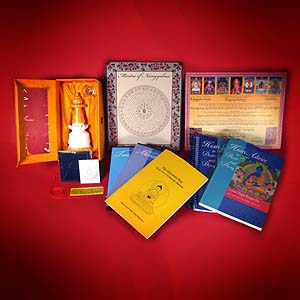
The Liberation Box contains many resources recommended by Lama Zopa Rinpoche to help one’s self and others at the time of death.
It is difficult to accept the inevitability of our own deaths or the deaths of our loved ones. And yet, all of us live our lives with reminders of impermanence and the loss of those we hold dear. While avoiding death is not possible, preparing for death and equipping one’s self with the tools to help those around us engage with their deaths in the most beneficial way is possible. Waiting until someone is actively dying is too late to help them most effectively.
Lama Zopa Rinpoche has given extensive advice and instruction for caring for others (and ourselves) at the time of death, or during the process of dying. On Rinpoche’s advice, FPMT Education Services put together a resource kit, Liberation Box, which contains essential materials needed at the time of death.
Ideally, several individuals within each FPMT center’s community would be educated on how to use this collection of resources so they can assist community members (and themselves) as death draws near.
The Liberation Box includes:
- Easy to follow instruction booklet for what to recite, what to play, and what to place on the body
- Recitations for Alleviating Pain MP3
- Recitations for the Time of Death MP3
- Liberation Card for a dying Person to look upon
- Large Namgyalma mantra card to look upon
- Stupa filled with the Four Dharmakaya Relic mantras to be placed at the crown ( approx 6.5 long x 3 Inch width)
- Small Namgyalma mantra card, The Ten Powerful mantras, and Shertor text to be placed on the body
- Phowa pill made by the late Geshe Lama Konchog of Kopan Monastery to be placed on the crown
- Blessing string to be placed on the chest or upper torso
There are several death and drying resources available to you. Lama Zopa Rinpoche’s Advice page, the Death and Dying resource page, and the FPMT Foundation Store has many materials available as well.
- Tagged: death, death and dying
- 0
1
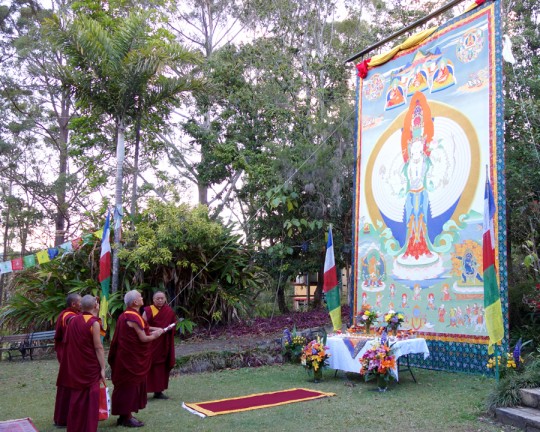
Lama Zopa Rinpoche with large Chenrezig thangka at Chenrezig Institute, Eudlo, Queensland, Australia, September 2014. Photo by Ven. Roger Kunsang.
“… Having a positive attitude, such as the altruistic thought to help other sentient beings and not harm them, is the cause of success in life. Even though some people might not have much education, they have no difficulties in life; they are wealthy and have harmonious relationships, and whatever they wish for happens. The reason for this is the cause created in the past. This is the actual evolution; this is where their happiness comes from. But when we do not analyze, when we are not aware, it looks as if success came from outside and does not depend on their mind,” Lama Zopa Rinpoche said in a teaching from 1991 recently published on the Lama Yeshe Wisdom Archive.
“It’s the opposite for people who are experiencing difficulties in their life. Their actions are motivated by ill will, jealousy, selfishness, dissatisfaction, desire, ignorance, anger and so forth, and their problems and difficulties result from that. Even though this is the actual evolution, when we do not understand or are not aware of karma, of action and result, it appears as if success and difficulties come from outside. We may have heard of karma and sometimes talk about it or meditate on it, but we are not aware of it in our everyday life.
“Happiness and success in life depends on transforming the mind, on making the mind better. Through that our actions become better; it depends on developing a positive attitude. Our mental continuum has all the potential to be completely transformed into the right path; we can completely purify all the negative imprints left on our mental continuum by our negative actions, which produce the problems in our life. Transforming our mind makes it impossible to experience the action and the resultant problems. Our mental continuum has all this potential.
“Therefore, meditation is extremely important in our life. It is the most important method for obtaining happiness in our everyday life. If we think more broadly, meditation brings not only temporary happiness but especially ultimate happiness, the peerless happiness of full enlightenment – when this mental continuum is completely pure, free of every single mistake, even the subtle imprints, the obscurations, and has completed all the qualities, all the realizations. Then we are able to bring everyone else to the peerless happiness of full enlightenment by freeing them from all their problems and obscurations, from their disturbing thoughts and even the imprints left on the mind. We have a fully knowing mind, having completed training the mind in compassion and having the perfect power to guide everyone according to the level of their mind. …”
You can read the complete teaching “Transforming the Mind in Everyday Life” on the Lama Yeshe Wisdom Archive.
Lama Zopa Rinpoche is the spiritual director of the Foundation for the Preservation of Mahayana Tradition (FPMT), a Tibetan Buddhist organization dedicated to the transmission of the Mahayana Buddhist tradition and values worldwide through teaching, meditation and community service.
- Tagged: advice, lama zopa rinpoche
- 0
28
“… Many different conditions can cause stress: the fear of your partner dying or of losing them to someone else, failure in business, loss of a job, illness, or not getting some person or object that you want. With desires focused solely on the happiness of this life, you worry that you will not obtain the pleasures you selfishly seek. This dissatisfied, desirous mind is one of the main causes of stress,” Lama Zopa Rinpoche said in a teaching in 1990 in Sydney, Australia, that has been recently published on the Lama Yeshe Wisdom Archive.
“The general method to deal with stress is to look at life in a positive rather than negative way. Looking positively at your problems is itself a meditation that transforms the mind into happiness. Reflecting on the benefits of your problems releases your squeezed, uptight mind and brings relaxation in your heart.
“Another approach is to meditate on experiencing the problem you are going through on behalf of others. Think, ‘I am experiencing this problem on behalf of all other beings. Instead of allowing countless other human beings to experience it, I alone will take all these problems upon myself, so that all others can be free of them.’ This attitude stops the problem because it purifies the cause of the problem, which is within your mind. Purifying the cause solves the problem. Experiencing your problems in this way keeps your mind happy and benefits others. And when your problem benefits others, it benefits you. …”
You can read the complete teaching, “How to Be Happy,” on the Lama Yeshe Wisdom Archive. Parts of this teaching have also been published in Wisdom Publication’s book How to Be Happy by Lama Zopa Rinpoche.
More information, photos and updates about FPMT spiritual director Lama Zopa Rinpoche can be found on Rinpoche’s webpage. If you’d like to receive news of Lama Zopa Rinpoche via email, sign up to Lama Zopa Rinpoche News.
- Tagged: advice, lama zopa rinpoche
- 0
25
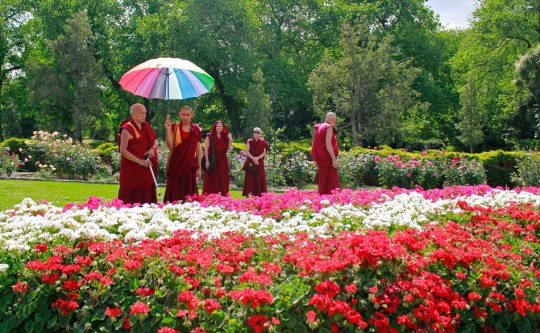
Lama Zopa Rinpoche in the park, Bendigo, Victoria, Australia, October 2014. Photo by Ven. Lobsang Sherab.
“Offering one tiny flower to a statue or picture of Buddha receives immeasurable, limitless, merit. All the paths to happiness result from that. With just one grain of rice or one tiny flower, you can enter the path and achieve total enlightenment – the completion of all good qualities,” Lama Zopa Rinpoche advised.
“After achieving enlightenment, you can liberate so many sentient beings from so much suffering and samsara and bring them to enlightenment. This is the result of offering one tiny flower. Each offering has all this benefit – like putting money in the bank. One dollar equals one billion trillion dollars in interest. This is an amazing benefit. It is important to remember this every day and offer as much as possible. If you see a beautiful flower, you visualize offering it to the guru and Buddha. The result and benefit is incredible. You can offer every single flower in a garden – the merit received is mind-blowing.
“This is how you use your precious human life, which is extremely rare and hard to find. Every time you see an object, use it to become closer to liberation and enlightenment. Many times each day, use your precious human rebirth to bring you closer and closer to liberation and enlightenment and thus to enlighten all sentient beings.”
Read more of Lama Zopa Rinpoche’s on “Offering Practices” in “Lama Zopa Rinpoche’s Online Advice Book,” which is part of the Lama Yeshe Wisdom Archive.
Learn more about Lama Zopa Rinpoche, spiritual director of the Foundation for the Preservation of Mahayana Tradition (FPMT), and Rinpoche’s vision for a better world. Sign up to receive news and updates.
- Tagged: advice, lama zopa rinpoche, offerings
- 0
21
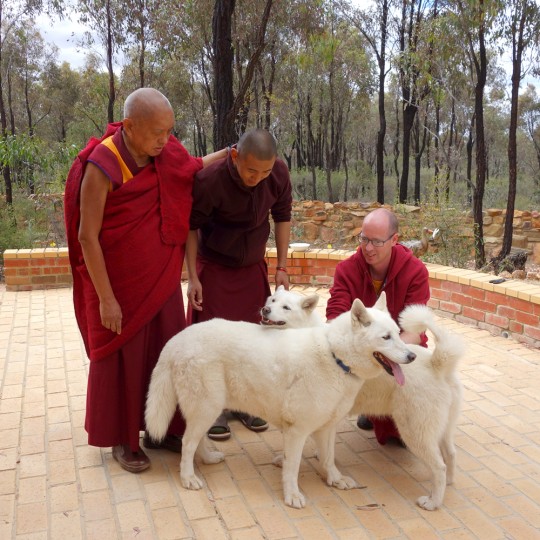
Lama Zopa Rinpoche blessing dogs at Thubten Shedrup Ling Monastery, Bendigo, Australia, October 2014. Photo by Ven. Roger Kunsang.
Lama Zopa Rinpoche has given much advice on benefiting animals. Here is a suggestion for helping your pets and other animal friends:
“It’s also extremely good to bless food before you give it to animals. If you can’t do it for every meal, then you can bless all the food at the same time. Recite the five powerful mantras or OM MANI PADME HUM, Medicine Buddha, and Milarepa mantras. All of these have power and help anyone who eats this food to not be reborn in the lower realms; it blesses their mind and purifies negative karma. If you can, do it every time you feed them – recite the mantras and blow on the food. This is the biggest gift you can offer them: it causes a good rebirth, so they can escape samsara, achieve liberation, and acquire the positive imprints of the Mahayana teachings and mantras that lead to enlightenment.
“I asked the people who take care of our dogs at Tushita Centre in Dharamsala to recite the Maitreya Buddha prayer and mantra, the Lama Tsongkhapa praise to Guru Shakyamuni Buddha – ‘Having Found the Realization of Dependent Arising’ – and other prayers and mantras to the dogs, while holding a biscuit in their hand, so all the dogs wait patiently. It looks like they are respectfully listening to the teachings, with their eyes looking at the biscuit, all sitting humbly.”
Read more of Lama Zopa Rinpoche’s instructions “How to Benefit Animals” on “Lama Zopa Rinpoche’s Online Advice Book,” which is part of the Lama Yeshe Wisdom Archive.
More information, photos and updates about FPMT spiritual director Lama Zopa Rinpoche can be found on Rinpoche’s webpage. If you’d like to receive news of Lama Zopa Rinpoche via email, sign up to Lama Zopa Rinpoche News.
- Tagged: advice, animals, lama zopa rinpoche
- 0
19
Recieve the Oral Transmission of the Sutra of Golden Light ONLINE
During the retreat in Australia September-October 2014, Lama Zopa Rinpoche agreed to allow those who listen to a recording of Rinpoche giving the oral transmission of the Sutra of Golden Light to receive the transmission in full. You may receive this oral transmission by listening to the audio or from watching and listening to it on video.
FPMT Education Services has added the audio and video of Rinpoche giving the oral transmission to the sutra to the main Sutra of Golden Light page. You must listen to the entire sutra recitation to receive the oral transmission.
This sutra is inconceivable,
For its ocean of virtue is without end;
It frees every being
From countless oceans of suffering.
—Shakyamuni Buddha
You may download this powerful sutra in a variety of languages or report your recitations for a global tally. One of Lama Zopa Rinpoche’s Vast Visions for the FPMT organization is for the Sutra of Golden Light to be recited for world peace.
Through comprehensive study programs, practice materials, training seminars, and scholarships, FPMT Education nourishes the development of compassion, wisdom, kindness, and true happiness in individuals of all ages.
- Tagged: golden light sutra
- 0
18
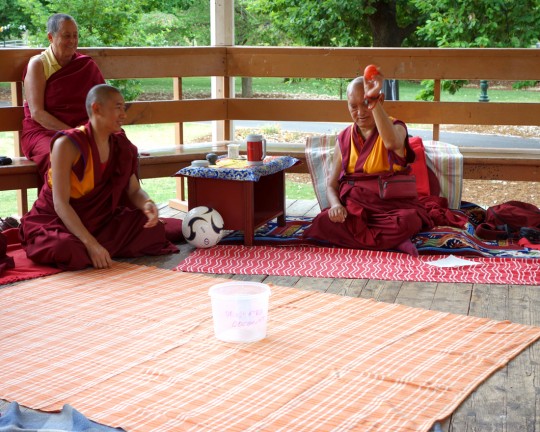
Lama Zopa Rinpoche practices tossing a small ball into a bucket during a picnic in Bendigo, Australia, October 2014. Photo by Ven. Roger Kunsang.
“People put a lot of effort into climbing Mount Everest, but it means nothing. They spend millions of dollars climbing Mount Everest just to get a reputation, just to get some dry name,” Lama Zopa Rinpoche taught to the students of the 33rd Kopan Course in 2000. “They put so many hundreds of thousands of dollars into a project which is totally meaningless. People spend so much money and effort and for their whole life they put effort into things which are totally meaningless and they only create negative karma, because their motivation is just attachment. It means nothing, and they totally waste all their money and their life, because they put so much effort for so many years into nothing.
“There are so many people in the world who have received a precious human body but are totally wasting it by doing meaningless actions. So, it is very important, while we are here, to follow the path to enlightenment. Even if we die while doing prostrations to the Buddha, we are still practicing Dharma, so if we die it is worthwhile. …”
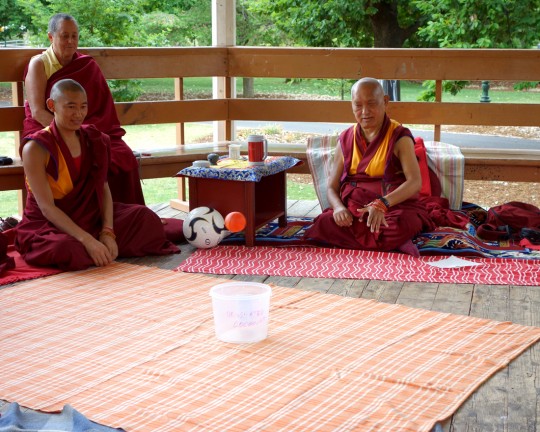
Lama Zopa Rinpoche practices tossing a small ball into a bucket during a picnic in Bendigo, Australia, October 2014. Photo by Ven. Roger Kunsang.
Excerpted from the teaching “Putting Effort into Dharma Practice” found at the Lama Yeshe Wisdom Archive.
More information, photos and updates about FPMT spiritual director Lama Zopa Rinpoche can be found on Rinpoche’s webpage. If you’d like to receive news of Lama Zopa Rinpoche via email, sign up to Lama Zopa Rinpoche News.
- Tagged: joyful effort, lama zopa rinpoche
- 0
17
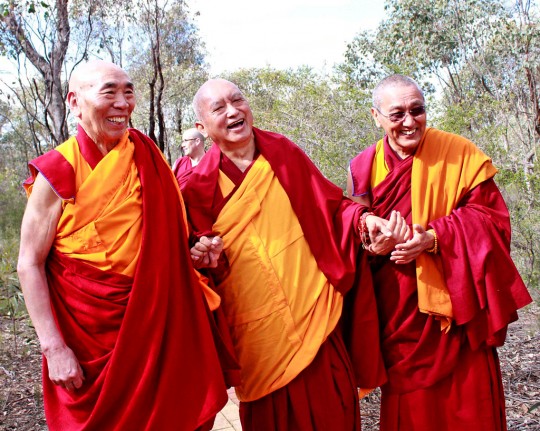
Lama Zopa Rinpoche with Geshe Doga and Khen Rinpoche Geshe Chonyi, Thubten Shedrup Ling, Bendigo, Australia, September 2014. Photo by Ven. Lobsang Sherab.
From Lama Zopa Rinpoche’s “Compassion Is of the Upmost Need”:
From the Sutra Request by Lodro Gyatso: “The thought of complete enlightenment, preserving Dharma, practicing Dharma and having love and compassion for living beings: these four dharmas have infinite qualities – the limit of their benefits is not seen by the Victorious Ones. It is said that preserving Dharma and protecting the lives of living beings has limitless benefits.”
This shows that if we have COMPASSION for sentient beings, from those we can’t see with the naked eye but only under a microscope up to creatures the size of a mountain, then the Buddha has never explained the limits of the benefits of the compassion we generate for them. It’s the same as saving the lives of human beings, animals and insects; we must understand that it has limitless benefits.
A free PDF download of “Compassion Is of the Upmost Need,” Rinpoche’s 10 quotes on compassion, is available from the Foundation Store in letter and A4 formats.
More information, photos and updates about FPMT spiritual director Lama Zopa Rinpoche can be found on Rinpoche’s webpage. If you’d like to receive news of Lama Zopa Rinpoche via email, sign up to Lama Zopa Rinpoche News.
- Tagged: compassion, compassion is of the utmost need
- 1
12
Practices of Arya Sitatapatra (White Umbrella Deity)
FPMT Education Services has recently published a new collection of two Sitatapatra (also known as White Umbrella Deity) practices. Practices of Arya Sitatapatra includes, “The Supreme Accomplishment of Sitatapatra,” and “Praises and Repelling Practices of Sitatapatra.” You can download this collection from the FPMT Foundation Store.
Both of these practices were translated by Joona Repo for FPMT Education Services and reviewed by the Sera Je Translation Committee.
In addition to many benefits of engaging in these practices, Lama Zopa Rinpoche has recently recommended that these two practices are beneficial to helping bring peace to situation between Israel and Palestine.
Through comprehensive study programs, practice materials, training seminars, and scholarships, FPMT Education nourishes the development of compassion, wisdom, kindness, and true happiness in individuals of all ages.
- Tagged: white umbrella deity
- 0
12
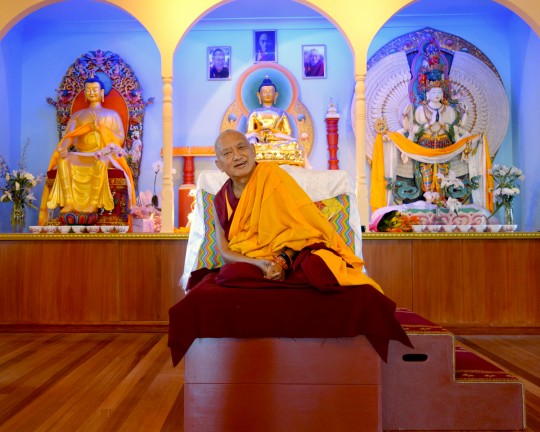
Lama Zopa Rinpoche in the new gompa at Thubten Shedrup Ling Monastery, Bendigo, Australia, November 2014. Photo by Ven. Roger Kunsang.
Lama Zopa Rinpoche offered this advice on the nature of the mind:
“The mind is like dough, which means you can make it into any shape: emotional, non-emotional, happy, not happy.
“Mind is like a child, so you should become the parents, like the father and mother watching and guiding the child. If you follow the child, if you become the child, it makes you crazy. Then, you always create obstacles and life becomes suffering.
“Or you become the guru and the mind is like the disciple – you watch and guide it. Or you are like a spy. You should be like a spy with your mind, always watching and blocking it when it is being negative and doing harm. It is like spying on a political person, examining what the person is thinking and planning, whether the person is performing positive actions or negative actions.
“Also, it is like you are the captain and the mind is the boat. Or you are the driver and the mind is the car, so therefore you have to always watch the car, and pay attention that you are traveling on the right road.
“If you don’t behave like this, then you are controlled by the mind.”
– Lama Zopa Rinpoche, from the page on “Meditation Practice” in “Lama Zopa Rinpoche’s Online Advice Book,” part of the Lama Yeshe Wisdom Archive.
Learn more about FPMT spiritual director Lama Zopa Rinpoche and his beneficial activities by visiting Rinpoche’s webpage, where you will find links to Rinpoche’s schedule, new advice, recent video, photos and more.
- Tagged: lama zopa rinpoche, nature of mind
- 0
10
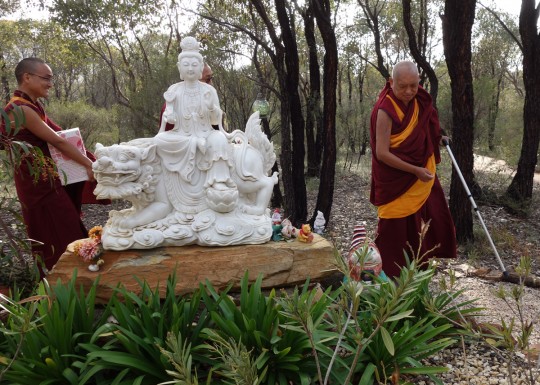
Lama Zopa Rinpoche on the path between the Great Stupa of Universal Compassion and Thubten Shedrup Ling Monastery, Australia, October 2014. Photo by Ven. Roger Kunsang.
“When Gelek Rinpoche was living in Delhi, he mentioned during teachings that the poor laborers working outside under the hot sun building roads or doing construction work look up through the windows of the large houses and see the air conditioning and fans,” Lama Zopa Rinpoche shared in Bodhisattva Attitude. “For them it seems like heaven and they think, ‘Those people have so much comfort and pleasure! How wonderful their lives are! They have no problems, only happiness!’ At the same time, the wealthy people living in the houses look down at the laborers and think, ‘Those people working on the road have such a good, simple life with no heavy responsibilities or problems!’ They are attracted to the poor people’s lives because they have so many business and relationship problems and a lot of worry and fear.”
“In a similar way, Kyabje Chöden Rinpoche explained that the mental suffering of the devas is heavier than the physical suffering of animals.
“Numberless times we have been born and suffered like this in samsara due to ignorance, looking at the aggregates as being the I, the self, when in reality there is no I or self. This is the main wrong concept and from that come three others. …”
From Chapter 6, “Four Wrong Concepts,” of Bodhisattva Attitude: How to Dedicate Your Life to Others by Lama Zopa Rinpoche, edited by Ven. Sarah Thresher and published by Lama Yeshe Wisdom Archive.
Learn more about FPMT spiritual director Lama Zopa Rinpoche and his beneficial activities by visiting Rinpoche’s webpage, where you will find links to Rinpoche’s schedule, new advice, recent video, photos and more.
- Tagged: advice, bodhichitta, lama zopa rinpoche
- 0
7
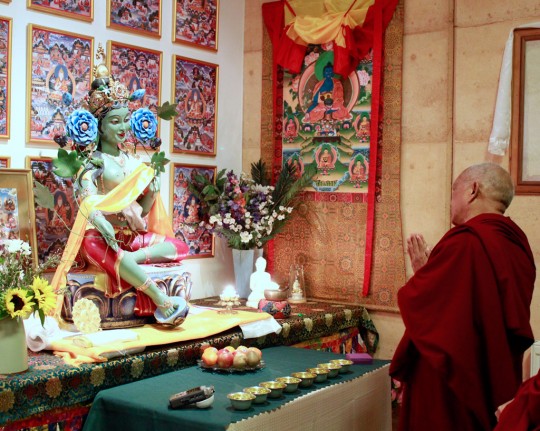
Lama Zopa Rinpoche blessing the Green Tara statue in Atisha Centre’s gompa, Bendigo, Australia, September 2014. Photo by Ven. Thubten Kunsang.
“It is said that there will come a time soon when there will no more qualified teachers to guide us. The teachings will still exist in books, and perhaps our wish to progress on the path will be there, but we will be without guides. And without somebody to lead us to enlightenment it will be impossible because the most subtle subjects can only really be understood, and more importantly realized, by taking guidance from a fully qualified teacher,” Lama Zopa Rinpoche teaches in the first chapter of Perfect Human Rebirth: Freedom and Richness on the Path to Enlightenment.
“Therefore, we must generate the determination to make the most of every moment. At this time, with this body and mind, in this environment, we have a unique and precious opportunity to understand the teachings of the Buddha and to generate the realizations of the path to enlightenment. If we attempt it, there is nothing we cannot do. We need to see this. We need to understand how limitless our potential is and not block our precious chance with delusions of incapability. ‘I can’t do it! I’m hopeless.’
“It is time to have big thoughts – huge thoughts! It is time to make vast plans, to lay out the immense project ahead of us and feel so happy that we can achieve our goal to develop ourselves to our ultimate potential. We have perfect role models in the Buddha and the numberless great yogis who followed him, as well as the precious lamas we have the fortune to be able to take teachings and gain inspiration from, and we have the understanding that we have exactly the same potential as they do. Shakyamuni was exactly like us once; His Holiness the Dalai Lama was exactly like us once. In turn, we can be exactly like them. All the conditions are there. What it needs now is our determination.”
From Chapter 1, “What is Dharma?” in Perfect Human Rebirth: Freedom and Richness on the Path to Enlightenment by Lama Zopa Rinpoche, edited by Gordon McDougall and published by Lama Yeshe Wisdom Archive.
More information, photos and updates about FPMT spiritual director Lama Zopa Rinpoche can be found on Rinpoche’s webpage. If you’d like to receive news of Lama Zopa Rinpoche via email, sign up to Lama Zopa Rinpoche News.
- Tagged: advice, lama zopa rinpoche, perfect human rebirth
- 0
- Home
- News/Media
- Study & Practice
- About FPMT Education Services
- Latest News
- Programs
- New to Buddhism?
- Buddhist Mind Science: Activating Your Potential
- Heart Advice for Death and Dying
- Discovering Buddhism
- Living in the Path
- Exploring Buddhism
- FPMT Basic Program
- FPMT Masters Program
- FPMT In-Depth Meditation Training
- Maitripa College
- Lotsawa Rinchen Zangpo Translator Program
- Universal Education for Compassion & Wisdom
- Online Learning Center
- Prayers & Practice Materials
- Overview of Prayers & Practices
- Full Catalogue of Prayers & Practice Materials
- Explore Popular Topics
- Benefiting Animals
- Chenrezig Resources
- Death & Dying Resources
- Lama Chopa (Guru Puja)
- Lama Zopa Rinpoche: Compendium of Precious Instructions
- Lama Zopa Rinpoche: Life Practice Advice
- Lama Zopa Rinpoche Practice Series
- Lamrim Resources
- Mantras
- Prayer Book Updates
- Purification Practices
- Sutras
- Thought Transformation (Lojong)
- Audio Materials
- Dharma Dates – Tibetan Calendar
- Translation Services
- Publishing Services
- Teachings and Advice
- Find Teachings and Advice
- Lama Zopa Rinpoche Advice Page
- Lama Zopa Rinpoche: Compendium of Precious Instructions
- Lama Zopa Rinpoche Video Teachings
- ༧སྐྱབས་རྗེ་བཟོད་པ་རིན་པོ་ཆེ་མཆོག་ནས་སྩལ་བའི་བཀའ་སློབ་བརྙན་འཕྲིན།
- Podcasts
- Lama Yeshe Wisdom Archive
- Buddhism FAQ
- Dharma for Young People
- Resources on Holy Objects
- Ways to Offer Support
- Centers
- Affiliates Area
- Teachers
- Projects
- Charitable Projects
- Make a Donation
- Applying for Grants
- News about Projects
- Other Projects within FPMT
- Support International Office
- Projects Photo Galleries
- Give Where Most Needed
- FPMT
- Shop
Translate*
*powered by Google TranslateTranslation of pages on fpmt.org is performed by Google Translate, a third party service which FPMT has no control over. The service provides automated computer translations that are only an approximation of the websites' original content. The translations should not be considered exact and only used as a rough guide.Problems come when you are not living in a natural state of mind. Then, no matter what you are doing, your mind will be on something else. You are supposed to be cleaning your house, but your mind is thinking about going to the beach and eating ice cream. That is when you run into difficulties.







